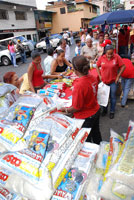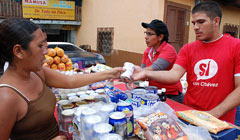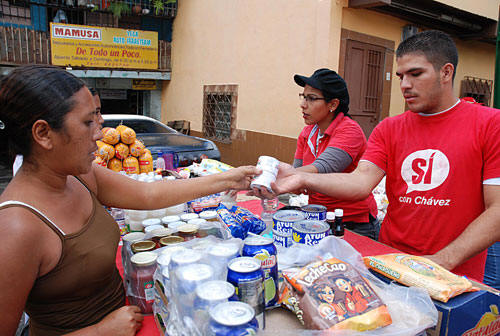 August 24, 2008
The
Mercal network increases
A CubaNews
translation by Odilia Galván Rodríguez.
The trucks arrived with food at sun-up, and everyone knows that long before the astral king returns to his hiding place, the cargo will be spent, quickly dispatched from the improvised stands put up in an alley. — And you, will you be buying chicken? — Carmen Elena asks, confusing me with another client. Laguna de Lídice [Lídice Lagoon] is the name of this sector (neighborhood). It sits very high up in the hills from which much of the city can be seen: below, in the center, in a plain surrounds by the hills, always accompanied by the clouds that are so close it seems as though they touch each other… Like here in La Pastora, one of the parishes that makes up the combative Municipio Libertador [1] which in the past, was the most forgotten area of Caracas. From its heights came much of the human tide that "rescued" the constitution, demanding the return of kidnapped President Hugo Chávez, on April 12 and 13 of 2002, cutting short the coup led by, the soon to be fleeing, Pedro el Breve [2].
Photograph shows another Venezuelan subsidized food market. — What you go there to find is always available. Its narrow and winding streets descend now, now they climb until you reach the summit, which visibly and without using a map, could be counted among the highest in the capital.
—We always come here, my wife or me; here the prices are much cheaper! — He shares openly with us, without exhibiting any macho embarrassment about it. Pasta, beans, butter, are at prices which are much more affordable than in the commercial chains, where everything is brand name. Nevertheless, here the quality is still good. Carmen says that the greatest demand is for chicken, oil, coffee, sugar and rice. Milk is also in high demand: the package, which elsewhere can cost up to 20 Bolivar’s, here costs barely five. It is a subsidized food, which the State sells to assist those with fewer economic resources. —In an "operational parish"— as it is called, "In one day we serve up to 2,000 people," explains the young woman, who despite her youth, manages the cooperative, which serves four mobile "bodegas" (stores) like this one. It is worth visiting a different locality everyday regardless of how far away it might be. — She says, we start at seven o'clock in the morning, and by noon, there is nothing left. In charge of keeping an accounting of all products sold and other records, Carmen Elena estimates that in one day, their cooperative can sell up to 4,000 tons of food. Last weekend, the Mercal network (Food Markets) reported selling 680,000 tons in 20 states utilizing these operations, a sort of small roving market that moves across the country, providing residents convenient access to basic products, with prices more accessible to their shallower pockets. The program was launched about five years ago, as part of the Bolivarian project’s effort to achieve social justice and whose goal to continue improving remains in tact. Born later, the PDVAL’s3 step on the heels of the 'mercalitos' (corner stores) but there are those like Alexander —a driver who is around 30 years old and, by his appearance, a lover of good eating— who love them because they are always in the same place and open until late. — What you go there to find is always available. All right! The markets were the initiative of one of the PDVSA’s [4], rescued from the hands of the oligarchy, which now use the country’s oil profits to assist the people. The PDVAL’s are governed by the Gaceta, and apply the so-called solidarity prices, and, continue being low priced compared to the "super" [markets]. Anyone would think that the mercalitos and pdvales are more attractive in recent weeks, with the slight increase in prices of a dozen product lines decreed by the Government, while freeing up of others from established price limits previously placed on them — in order to ensure they are not missing from the shelves. But Carmen Elena denies this. — People are still coming in, as always, there is a lot of flow, as usual. Though it is true that here prices have not changed, and remain identical. Zero shortage In a mixed economy, as is the Venezuelan, even though the State is the lead agency involved, private producers also participate, and their earnings were not recouping production costs of certain foods. To continue in that direction would have resulted in a decrease in supply with the added harmful effect of shortages to which the Government has said, “no”. To avoid this from happening, prices were regulated. Also — how to circumvent this! — Weigh external factors that today hang over the whole economy. Anyone could understand the increase decreed in Venezuela for white bread and pasta, among other products made from flour, when we know that the major derivative of wheat has increased its prices worldwide by 152 percent during the past two years. In line with the disparate price of agricultural products, which have increased because of the rising oil prices, and the environmental degradation, which join hands to make us all victims of today’s impoverishing food crisis. Thus, white bread along with pasta and oils are some of the products which here recorded slight increases, which were agreed to after meetings of various state agencies with the private sector. However, large industrial bakeries are not acting in line with a measure passed by the State in order for them to receive their corresponding production costs, which was a stimulus agreed to in order to encourage them to maintain products on the market. Last Friday, leaders of the National Bolivarian Federation of Flour accused the commercial bread businesses of lowering the quality of their "canillas," which is what our “pound” or loaves of bread are called, - and intentionally promoting a bread shortage at shop counters during peak hours, which they believe is an alleged attempt to further destabilize the country. Their antics should not be a surprise, as they are the same superrich of FEDECAMARAS [5] and the same Entrepreneurs and Industrialists Federation, which in 2002 was headed by the failed de facto president and coup leader, Pedro Carmona Estanga. Apart from that, the reported incendiary desire of that group is in tune with the apparent intent of the reactionary political opposition – to create chaos in the face of the upcoming regional elections in November. Producing more here Beyond platforms and measures to ensure food security - that is, citizens' access to food -, the final measure for the Bolivarian government to follow in this, and in other areas, is to provide Venezuela with the capacity to produce its own, which will allow it to be free from depending on imports. The task may not be easy for a country, which states that it still purchases approximately 80 percent of what people eat and that Venezuela, when the Bolivarian Revolution’s came to power, still had much of its land in the hands of unproductive estates — against whom it still struggles. Five of the decrees promulgated this month, according to the powers that gave the executive branch the Enabling Act, related to agriculture, who will unobjectionably make its first beneficiaries the bulk of society, leading to a leveling off of profits for the rich, abusive and exploitive private producers. That is why Chavez reiterated, that the opposition would like another coup, and to scorn the laws. Included in the decrees, are extensions on deadlines to those same producers, to enable them to pay their debts to the banks. Then there is financing for the Bank of Agriculture to grant more loans to poor farmers, the establishment of the food reserve as a government duty, as well as the regularization of the system, by ratifying the State’s leading role in food production. Hand in hand, agriculture is industrialized. Last Friday, in the state of Miranda, Chavez inaugurated the Algeria Laya banana processing plant, a socialist factory for the production of flour made from that fruit, and where exquisite tostones [6], which were also sampled by the President, will be produced. He proclaimed, "Agriculture is vital to the life of a people. A day will come when we are self-sufficient in food production". Amid the explosion of so much fast food, the workers of Algeria Laya ensure that your tostones will provide a good dose of protein and will be very tasty. And the best thing: when local buyers read the label on the package, they may proudly say: 'Conchale, (wow) man, this is "Made in" Miranda ". Translator’s notes: 1 The Municipio Libertador (colloquially Caracas or old Caracas). 2 Pedro Francisco Carmona Estanga (born 1941 in Barquisimeto, Lara, Venezuela) is a former Venezuelan trade organization leader who was briefly declared President of Venezuela during an abortive 2002 military coup against Hugo Chávez. He occupied the office of President from April 12 to April 13. After the coup failed, Carmona, wanted by the authorities for illegal usurpation of power, escaped house arrest, fled to Colombia, and later surfaced in Miami, Florida. 3 Producción y Distribución Venezolana de Alimentos (PDVAL), is a nationwide food supply network created by Venezuelan president Hugo Chávez and Petróleos de Venezuela (PDVSA) in response to the high food demand and presumed stockpiling by private food sectors, creating food shortage. The PDVAL's goal is to distribute basic goods such as meat, milk, chicken and other goods which prices are regulated by the government. 4 Petróleos de Venezuela, S.A. (PDVSA) is the now state-owned petroleum company. 5 The Venezuelan Federation of Chambers of Commerce (Spanish: Federación de Cámaras y Asociaciones de Comercio y Producción de Venezuela) or Fedecámaras is composed of chambers of commerce (cámara in Spanish) in twelve basic trade groups: banking, agriculture, commerce, construction, energy, manufacturing, media, mining, ranching, insurance, transportation, and tourism. This organization is at political odds with the current Venezuelan president, Hugo Chávez. During a failed coup d'état against him in April 2002, former Fedecámaras president Pedro Carmona assumed the role of interim de facto president of Venezuela for two days. 6 Tostones - plantain chips. |
||||||
 Venezuela
La red MERCAL
incrementa venta
|
 |
| Lo que usted vaya a buscar allí siempre lo encuentra. |
Sin pizca de ansiedad,
hombres y mujeres aguardan
su turno en la «fila».
Mientras lee un
 periódico,
Otilio repasa mentalmente el
surtido que le han encargado
en casa.
periódico,
Otilio repasa mentalmente el
surtido que le han encargado
en casa.
—¡Siempre venimos; mi mujer o yo. Aquí es mucho más barato! —asegura, sin complejos machistas.
Pastas, caraotas (frijoles), mantequilla, se ven a precios mucho más asequibles que en las redes comerciales donde todo es de marca. La calidad, sin embargo, no baja.
Carmen asegura que la mayor demanda está en el pollo, el aceite, café, azúcar y arroz. También «sale» mucho la leche: el paquete, que en otro lugar puede costar hasta 20 bolívares, aquí vale apenas cinco. Es la comida subvencionada que el Estado vende para compensar a los segmentos sociales de menos recursos.
—En un «operativo parroquial» —como se le denomina—, «atendemos en un día hasta a 2 000 personas», explica la muchacha, quien a pesar de su juventud administra la cooperativa familiar que atiende cuatro «bodegas» móviles similares a esta.
Vale la pena visitar, cada día, una localidad diferente por lejana que esté.
—Empezamos a las siete de la mañana, y ya al mediodía apenas queda nada —asegura.
Encargada de llevar el récord de productos vendidos y otras cuentas, Carmen Elena calcula que en un día, su cooperativa puede vender hasta 4 000 toneladas de comida.
El pasado fin de semana, la red MERCAL (Mercados de Alimentos) reportó la venta de 680 000 toneladas en 20 estados mediante estos operativos, una suerte de pequeñas ferias itinerantes que se mueven por todo el país, facilitando a los vecinos el acceso cómodo a renglones básicos, con precios al alcance de los bolsillos menos gruesos.
El programa se puso en marcha hará unos cinco años, como parte del esfuerzo del proyecto bolivariano por alcanzar una justicia social cuyo perfeccionamiento sigue siendo meta.
Surgidos después, los PDVAL pisan los talones de los «mercalitos» y hay quienes como Alexander —un chofer que frisa los 30 años y, por su aspecto, es amante del buen comer— los prefieren porque siempre están en el mismo sitio y abiertos hasta tarde.
—Lo que usted vaya a buscar allí siempre lo encuentra, ¡vale!
Iniciativa de una PDVSA rescatada de las manos oligárquicas y que por eso puede emplear ahora en el pueblo las ganancias que deja el petróleo al país, los PDVAL se rigen por la Gaceta y adoptan los llamados precios solidarios. Sin embargo, allí siguen siendo bajos en comparación con los «super».
Cualquiera piensa que «mercalitos» y «pdvales» son más atractivos en las últimas semanas, ante el ligero aumento decretado por el Gobierno en los precios de una decena de renglones, y la «liberación» de otros que sacó del tope establecido para garantizar que no falten de las vidrieras.
Pero Carmen Elena niega.
—La gente sigue viniendo como siempre, hay mucha afluencia, es lo habitual. Aunque es cierto que aquí los precios no se han movido, permanecen idénticos.
Cero desabastecimiento
En una economía mixta como la venezolana, aunque el Estado sea el ente rector participan productores privados, cuyos ingresos no los estaban resarciendo de los costos de producción de determinados alimentos. Seguir así habría redundado en una baja de la oferta con el nocivo efecto de un desabastecimiento al que el Gobierno ha dicho «no». Para evitarlo, se regularon los precios.
También —¡cómo soslayarlo!— pesan factores externos que gravitan hoy sobre toda economía. Cualquiera podría entender el aumento decretado en Venezuela para el pan blanco y las pastas, entre otros productos elaborados con la harina, cuando se sabe que el importante derivado del trigo ha incrementado sus precios a nivel mundial en un 152 por ciento durante los dos últimos años, a tenor con el disparado precio de los productos del agro. Aumento del barril del petróleo y deterioro ambiental se dan la mano y nos hacen víctimas hoy de la empobrecedora crisis alimentaria.
De tal suerte, el pan blanco junto a las pastas y aceites constituyen algunos de los productos que registraron aquí leves aumentos, acordados luego de distintas reuniones de los entes estatales con el sector privado.
Sin embargo, los grandes industriales del pan no están actuando en consonancia con una medida dictada por el Estado para que recibieran en correspondencia con sus gastos de producción, y estimularlos a mantener la oferta en el mercado.
El último viernes, dirigentes de la bolivariana Federación Nacional de la Harina acusaron al emporio empresarial del pan de bajar la calidad de las «canillas» —como llaman aquí a nuestras «libras» o «flautas» de pan— y provocar, ex profeso, su ausencia en los mostradores de los expendios durante las horas-pico, en alegada maniobra que adivinan como un intento más para desestabilizar al país.
No deben sorprender los malos pasos: son los ricachos de FEDECÁMARAS, la misma Federación de Empresarios e Industriales encabezada en 2002 por el fallido presidente de facto y liderzuelo del golpe, Pedro Carmona Estanga.
Por demás, el denunciado deseo incendiario de esa agrupación está a tono con el ostensible propósito de la oposición política reaccionaria de crear el caos, frente a las elecciones regionales de noviembre.
Producir más aquí
Más allá de coyunturas y medidas para garantizar la seguridad alimentaria —es decir, el acceso de los ciudadanos a la alimentación—, el derrotero final del Gobierno bolivariano en este, como en otros rubros, es dotar a Venezuela de una capacidad de producir que le permita no depender de las importaciones.
La tarea podría no resultar fácil para un país que, se afirma, todavía compra afuera alrededor del 80 por ciento de lo que su gente come y que, al llegar la Revolución Bolivariana al poder, tenía buena parte de las tierras en manos de latifundios improductivos contra los cuales aún lucha.
Cinco de los decretos promulgados este mes, a tenor con los poderes que le dio al ejecutivo la ley Habilitante, tienen que ver con el agro, e inobjetablemente hará primeros beneficiarios al grueso de la sociedad, llevando a pique las ganancias abusivas de los ricos y explotadores productores privados. Por eso, reitera Chávez, la oposición quisiera un golpe otra vez, y denosta de las legislaciones.
Plazos más largos a esos mismos productores para que paguen sus deudas con la banca, facilidades al Banco Agropecuario para que conceda más préstamos a los campesinos pobres, establecimiento de la reserva alimentaria como un deber gubernamental, así como la regularización del sistema ratificando el papel rector del Estado en la producción de alimentos, están incluidos en los decretos.
A la par, el agro se industrializa. El último viernes, Chávez acaba de inaugurar en el estado de Miranda la planta procesadora de plátanos Argelio Laya, una fábrica socialista para la producción de harina a partir de ese fruto, y de donde saldrán también exquisitos tostones que fueron degustados por el Presidente.
«La agricultura es fundamental para la vida de un pueblo. Llegará un día en que seamos autosuficientes en alimentación», proclamó.
En medio de tanta explosión de comida fiambre, los trabajadores de la Argelio Laya aseguran que sus tostones aportarán, sin embargo, una buena dosis de proteínas y serán de muy buena digestión.
Y lo mejor: cuando los compradores locales lean el rótulo de los paquetes, podrán decir con orgullo: «Cónchale, compadre, esto es “Made in” Miranda».
 E-mail:
E-mail: